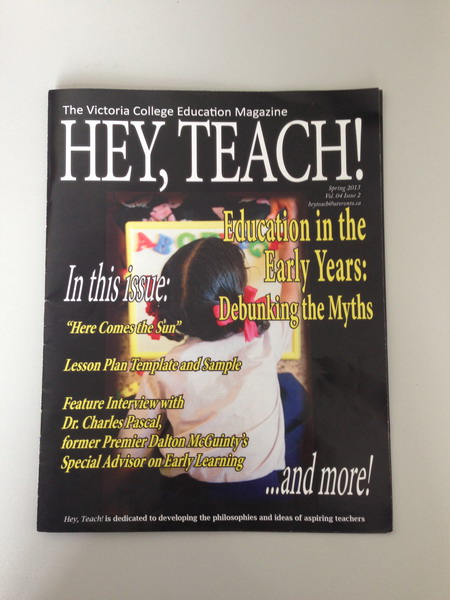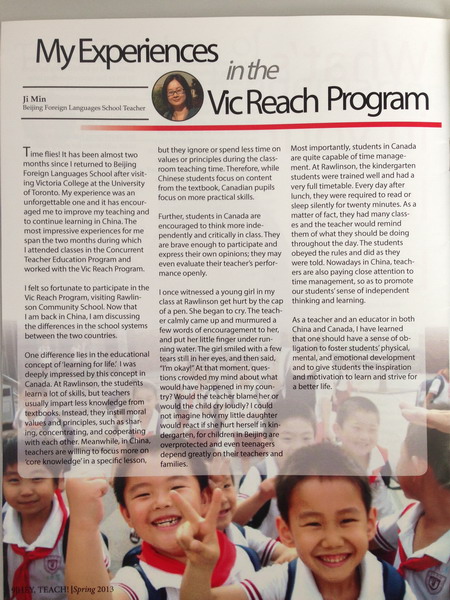·【多倫多大學(xué)學(xué)習(xí)報(bào)道】我校英語教師在VIC Reach項(xiàng)目中的交流經(jīng)歷
發(fā)布日期:2013-05-03 信息來源:
我是季敏,擔(dān)任北外附校初三年級(jí)組長(zhǎng)職務(wù)和英語教學(xué)工作,。2012年9月,,我有幸被學(xué)校派到加拿大多倫多大學(xué)學(xué)習(xí)。在一學(xué)期里的學(xué)習(xí)期間,,我收獲了很多,。回國(guó)后,,我利用寒假時(shí)間寫了一篇短文通過郵件形式發(fā)送給了我在多大學(xué)習(xí)時(shí)的老師Professor Jackie Eldridge ,,文章中我主要從教育理念、道德價(jià)值觀,、學(xué)生的獨(dú)立思維與批判性思維能力的培養(yǎng)以及時(shí)間管理四個(gè)方面簡(jiǎn)要談?wù)摿藘蓢?guó)學(xué)校教育體系的差異和自己的體會(huì)與感受,。
在Professor Jackie 和另一位老師Professor Sheila的幫助下,今年3月我的文章有幸被發(fā)表在維多利亞學(xué)院的教育期刊《HEY,TEACH!》 雜志上,。感謝兩位老師,,更感謝北外附校給我這次學(xué)習(xí)的機(jī)會(huì),我會(huì)將自己所學(xué)到的理論知識(shí)和教學(xué)方法在教學(xué)中不斷實(shí)踐與探索,,努力提高,,從而更好的為學(xué)生們服務(wù),。
(初三年級(jí)組 季敏)
附:
My Experiences in the Vic Reach Program
Ji Min Beijing Foreign Language School
Time flies, it has been almost two months since I returned to Beijing Foreign Languages School after visiting Victoria College at the University of Toronto. My experience was an unforgettable one and it has encouraged me to improve my teaching and to continue learning in China. The most impressive experiences for me span the two months during which I attended classes in the Concurrent Teacher Education Program and worked with the Vic Reach Program.
I felt so fortunate to participate in the Vic Reach Program, visiting Rawlinson Community School. Now that I am back in China, I am discussing the differences in the school systems between the two countries.
One difference lies in the educational concept of “ learning for life”. I was deeply impressed by the concept in Canada. At Rawlinson, the students learn a lot of skills, but teachers usually impart less knowledge from textbooks. Instead, they instill moral values and principles, such as sharing, concentrating, and cooperating with each other. Meanwhile, in china, teachers are willing to focus more on ”core knowledge” in a specific lesson, but they ignore or spend less time on values or principles during the classroom teaching time. Therefore, while Chinese students focus on content from the textbook, Canadian pupils focus on more practical skills.
Further, students in Canada are encouraged to think more independently and critically in class. They are brave enough to participate and express their own opinions; they may even evaluate their teacher’s performance openly.
I once witnessed a young girl in my class at Rawlinson get hurt by a cap of a pen. She began to cry. The teacher calmly came up and murmured a few words of encouragement to her, and put her little finger under running water. The girl smiled with a few tears still in her eyes, and then said” I am ok!” At that moment, questions crowded my mind about what would have happened in my country? Would the teacher blame her or would the child cry loudly? I could not imagine how my little daughter would react if she hurt herself in the kindergarten, for children in Beijing are overprotected and even teenagers depend greatly on their teachers and families.
Most importantly, students in Canada are quite capable of time management. At Rawlinson, the kindergarten students are trained well and had a very full timetable. Every day after lunch, they were required to read or sleep silently for twenty minutes. As a matter of fact, they had many classes and the teacher would remind them of what they should be doing throughout the day. The students obeyed the rules and did as they were told. Nowadays in china, teachers are also paying close attention to the time management, so as to promote our students’ sense of independent thinking and learning.
As a teacher and an educator in both China and Canada, I have learned that one should have a sense of obligation to foster student’s physical, mental and emotional development and to give students the inspiration and motivation to learn and strive for a better life.


熱點(diǎn)新聞
-
2024-05-24
北外附校邀請(qǐng)北外專家舉行高中學(xué)生法制講座
-
2023-12-26
【明德講堂】弘揚(yáng)外交精神 傳播外交智慧---外交官?gòu)垏?guó)斌為北外附校初一年級(jí)師生做主題講座
-
2023-12-14
揚(yáng)復(fù)語優(yōu)勢(shì) 促多元發(fā)展│北外附校舉辦2023年第二場(chǎng)校長(zhǎng)午餐會(huì)
-
2023-11-17
【初中·教育教學(xué)】“會(huì)”診學(xué)業(yè)質(zhì)量 賦能學(xué)生成長(zhǎng)
-
2022-05-30
小學(xué)教育簡(jiǎn)介(2022年5月版)




